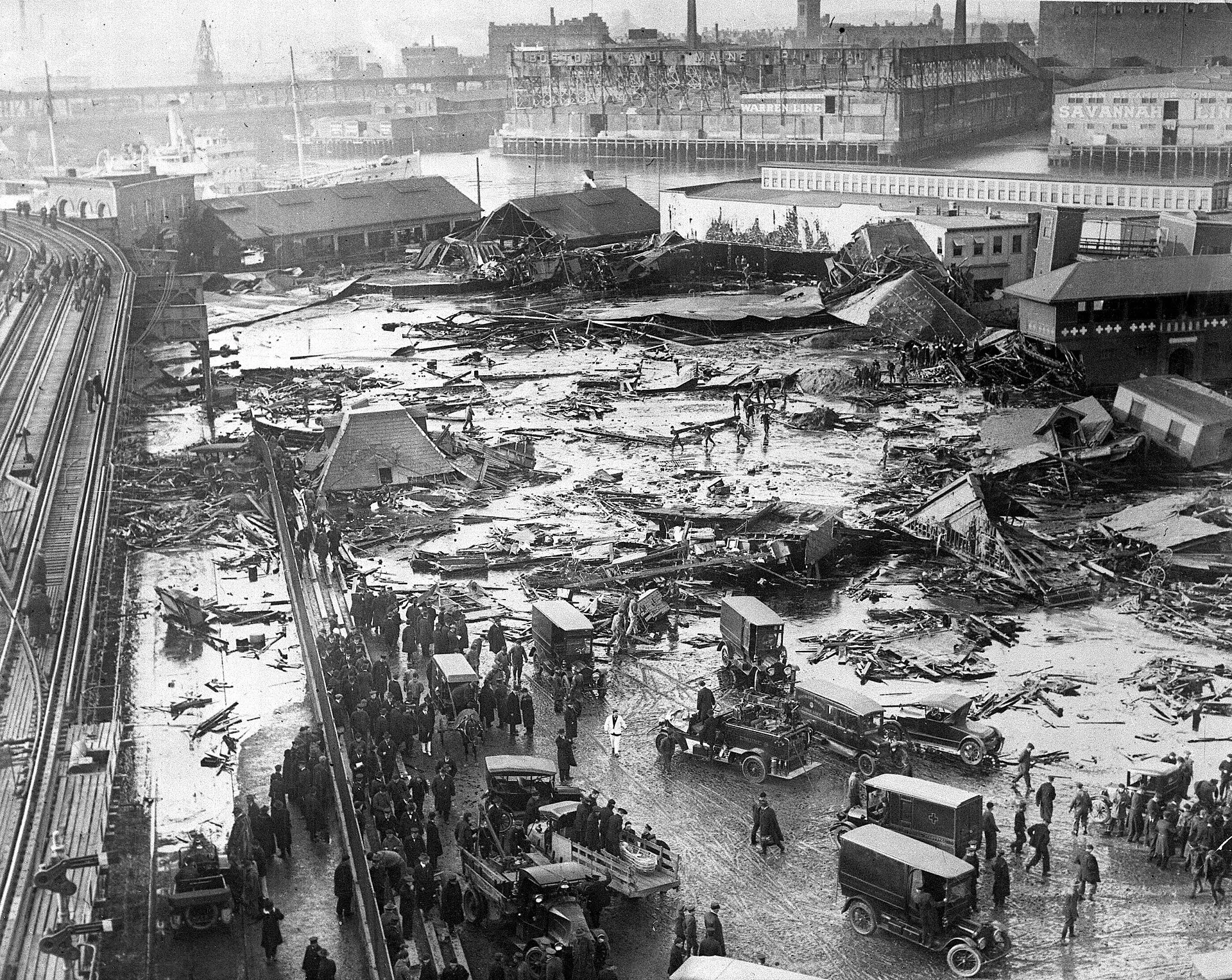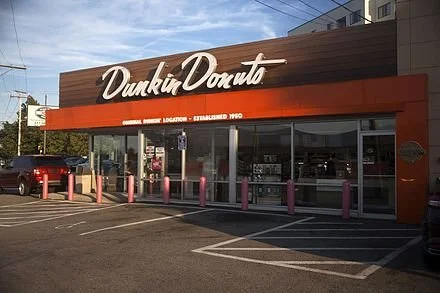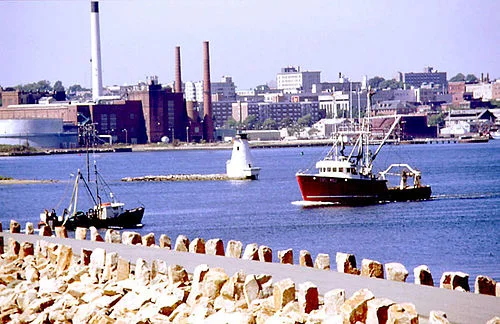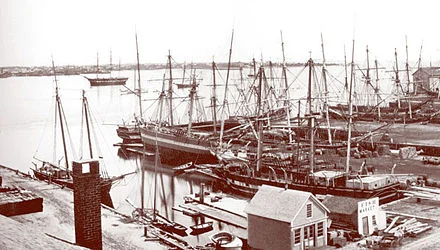
The real Boston?
Twenty one people were killed on Commercial Street in Boston’s North End on Jan. 15, 1919, when a tank of molasses ruptured and exploded. An eight-foot-high wave of the syrupy brown liquid moved down Commercial Street at 35 mph. Wreckage of the collapsed tank is visible in background, center, next to light -colored warehouse.
The original Dunkin’ Donuts store, in the Boston inner-suburb of Quincy.
“I guess no true Bostonian would trust a place that was sunny and pleasant all the time. But a gritty, perpetually cold and gloomy neighborhood? Throw in a couple of Dunkin’ Donuts locations, and I’m right at home.”
— Rick Riordan (born 1964), raised in Texas, this novelist now lives in Boston.
Gritty, cold and caffeinated
In East Boston
“I guess no true Bostonian would trust a place that was sunny and pleasant all the time. But a gritty, perpetually cold and gloomy neighborhood? Throw in a couple of Dunkin’ Donuts locations, and I’m right at home.”
― Rick Riordan, in The Sword of Summer
New Bedford as a green-energy Houston? thanks, Dunkin'; a big city running out of water
New Bedford Harbor.
From Robert Whitcomb's "Digital Diary,'' in GoLocal24.com:
Could southeastern New England become to offshore wind power what Houston has been for oil and natural gas? Maybe, but gradually. New Bedford’s Marine Commerce Port Terminal would probably be its center; it’s the first dock in the U.S. that’s strong enough to handle those very heavy offshore wind-turbine parts, and the Whaling City is all in about becoming a renewable-energy center.
Despite the Trump administration’s affiliation with the fossil-fuel industry, interest in offshore wind may be as intense as ever. The Boston Globe reported that an offshore-wind supply-chain conference held last year in Newton, Mass., attracted nearly 150 companies. And unions love this industry, which employs highly paid, highly skilled workers in the “blue-collar elite.’’
It’s too early to know what the impact of the Trump administration’s anti-green energy might be. U.S. solar-energy companies, for their part, have expressed concern that they’ll be hurt by the administration’s tough tariff policy on imports of solar panels from China.
Recently, survey ships for proposed projects south of Martha’s Vineyard have set forth from the Whaling City to study seabed conditions and plan transmission routes. Indeed, all the current developers for Massachusetts’ first wind projects have agreed to deploy from New Bedford. (Wouldn’t it be nice if Quonset could get some of that business?)
Another very promising port for offshore wind-turbine operations would be the recently decommissioned Brayton Point coal-fired plant, in Somerset.
New Bedford, Fall River, Quonset, Brayton Point and other places in southeastern New England could also become sites for other new renewable-energy projects that might develop, such as tidal and wave power. Meanwhile, the Trump administration would like to allow oil and gas drilling off New England near famous fishing areas….
New Bedford was an energy capital in the 19th Century because of the whale oil used for lighting; it was considered “clean’’ energy for the time. It was said to burn brightly and cleanly.
New Bedford Harbor in the late 19th Century, as the whaling boom disappeared.
xxx
Thank you, Canton, Mass.-based Dunkin’ Donuts, for deciding to phase out your polluting and nonrecylable foam cups by 2020. I hope that other fast-food operators do the same thing. These cups leave a mess: They last in the environment for many years. And the chemicals used to make them are dangerous. The main ingredient, styrene, may cause cancer in humans.
xxx
Cape Town, South Africa, is expected to run out of water in May, as extended drought, population growth and insatiable agricultural use drain aquifers. Some have linked the drought to man-made climate change.
The crisis in Cape Town recalls the sort of crisis that other basically dry places, such as Southern California, may soon face. Note that that drought continues to worsen across much of the West and South. But many places will eventually need detailed long-term and emergency measures to address climate change. In New England the biggest climate challenge will be coastal flooding; Boston had a foretaste of that last month during a big Northeaster.
New England’s, er, vigorous climate poses challenges but at least we have lots of fresh water – even more valuable than, say, oil.
Then you live in New England
“If you've worn shorts and a parka at the same time, you live in New England.''
“If you have switched from 'heat’ to 'A/C' the same day and back again, you live in New England.''
“If you carry jumpers in your car and your wife knows how to use them, you live in New England.''
“If driving is better in the winter because the potholes are filled with snow, you live in New England.''
“If you find 10 degrees 'a little chilly', you live in New England.''
‘’If there's a Dunkin' Donuts on every corner, you live in New England.''
-- Jeff Foxworthy
Joyce Rowley: Plastic bags on way out of Mass.?
By JOYCE ROWLEY/ecoRI News contributor
Six years ago, the city of Somerville passed one of the first ordinances in New England requiring large retailers to recycle plastic shopping bags. Now it’s poised to be one of the first to ban the bag in Massachusetts.
“It was a great victory,” said Alderman Rebekah Gewirtz of the earlier campaign to recycle plastic bags. Gewirtz is confident that a new law eliminating plastic shopping bags will also become a reality.
The Somerville Board of Alderman recently sent a draft ordinance to the legislative matters committee for final review.
“I’ve heard nothing but support for it from residents," said Alderman Mark Niedergang, a member of the energy and environment special subcommittee. “It’s time has come.”
Citing impacts to marine and land ecosystems by thin-film plastic shopping bags, the law would allow only compostable or marine-degradable plastic bags that meet certain standards. Reusable plastic bags with 2.25 millimeter thickness or better, as well as durable bags of other materials, could be handed out to customers.
The new law would apply to businesses greater than 2,500 square feet or with three or more stores in single ownership that have a combined size of 2,500 square feet, and retail pharmacies of any size with two or more stores under the same ownership within city limits.
Convenience stores that have gross annual sales in excess of $1 million would have to comply.
“Customers ask for them,” said Ben Weiner, owner of a local liquor store who spoke in opposition to the ban at a public hearing in November. Holding up a black plastic bag used at liquor stores, he said the bags are a convenience.
Resident Maureen Barillaro brought a large plastic bag full of retailers’ shopping bags she had collected along the Mystic River before the hearing. Reading from a list, she ticked off the names of the retailers the bags came from, and included the black bags favored by liquor stores.
"Somerville is a growing city with a large population. So there’s a lot of plastic bags,” Barillaro said. “A plastic bag ban is really the only way we're ever going to eliminate this issue.”
Somerville would be the sixth Massachusetts municipality to ban plastic shopping bags. Brookline, Manchester-by-the-Sea, Great Barrington and Nantucket have bans in place.
Nantucket's sweeping biodegradable packaging ban, in place since 1990, calls for using anything other than plastic or Styrofoam on all “packaging added to or supplied by vendors or commercial establishments within the Town of Nantucket for merchandize of any type being removed from the establishment.”
Somerville also passed a ban last year on polystyrene (Styrofoam). The law took effect in May and became enforceable in October.
Both ordinances were modeled after Brookline — the city’s polystyrene and plastic bag ban took effect last year. Those ordinances passed by a vote of Town Meeting in 2012.
“It’s going surprisingly well,” said Dr. Alan Balsam, Brookline’s director of public health, whose department is charged with enforcing the bans. “We expected difficulties.”
Balsam’s department supplied retailers with a list of vendors that supply alternatives to plastic. Still, the polystyrene ban took longer to get full compliance.
“Polystyrene is in every food place; there are over 350 in town,” Balsam said.
This year, 100 food services got six-month exemptions as allowed by the law, and about 80 received an extension to the end of 2014. Most are now in compliance except for one or two items, such as plastic coffee-cup lids and the condiment containers in take-out restaurants, according to Balsam. The chain coffee shops such as Dunkin’ Donuts and Starbucks have alternatives to both the cups and lids.
“You go to the grocery stores, and people put one item in a plastic bag,” said Gewirtz, the Somerville alderman. “They leave with dozens of bags. And where do the bags end up? They end up in the landfills and the waterways. They choke marine life and they never biodegrade. My hope is that we'll get plastic bags banned statewide.”
Massachusetts has yet to pass a plastic reduction or elimination law, although there are five proposed bans in committee.
Editor’s note: SCATV public access coverage of the Nov. 20 public hearing was used for a portion of this article.







